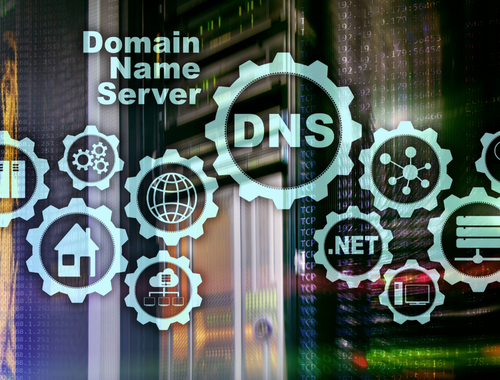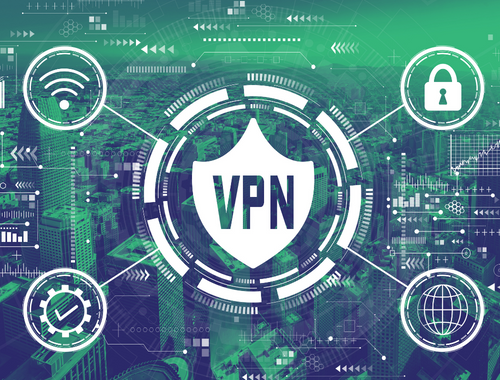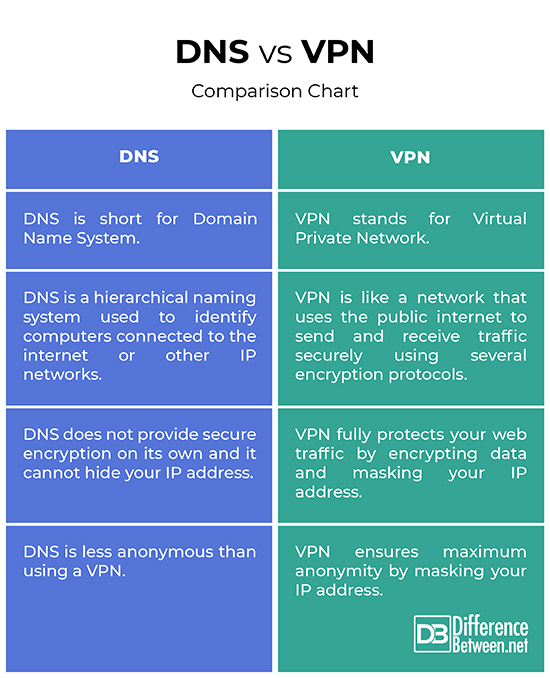Difference Between DNS and VPN
Privacy is one of the major concerns while using internet. We live in a connected world that constantly generates vast quantities of human information – information about everything. Several countries also have certain location-specific restrictions, which basically limits your access to web content while traveling. All this because of privacy concerns, and more. However, there are specific tools that allow you to bypass such security measures. Two of the most common tools that allow you to access geo-locked content are DNS and VPN. Each of them serves a very different purpose. Let’s take a look how the two fit into the narrative.

What is DNS?
DNS, short for Doman Name system, like a phone registry, is an address book of the internet. It is a hierarchical naming system used to identify computers connected to the internet or other IP networks. DNS translates internet host names into IP addresses and is used with all internet servers. The DNS is one of the fundamental building blocks of the internet and is used every time you visit a website, send an email, or do anything online. Like we said, it’s a directory for the internet that contains domain names and translates them into IP addresses. DNS servers store these IP addresses so you do not have to memorize each one of them. You could say, without DNS, the internet would cease to exist or would be a total mess.

What is VPN?
VPN is short for Virtual Private Network. It’s an encrypted connection that extends a private network across a public network to help you stay private online. It is basically protects your internet connection and privacy by masking your IP address. It fully protects your web traffic by encrypting data, thereby ensuring anonymity by changing your IP address. You can think of VPN as a network that uses the public internet to transfer traffic securely, using many encryption protocols. In a broader sense, VPN is the joining of two of more networks, or parts of the network at different locations, with the objective of creating a single network. IP VPNs are the standard for remote VPN access and allow an organization to make use of the existing network infrastructure as a means for remote employees to access the network remotely.
Difference between DNS and VPN
Functionality
– While both the DNS (Doman Name system) and VPN (Virtual Private Network) systems work to un-block geo-restricted content, each one is very different in terms of functionality. DNS is one of the fundamental building blocks of the internet, a hierarchical naming system used to identify computers connected to the internet or other IP networks. VPN is like a network that uses the public internet to send and receive traffic securely using several encryption protocols. It basically extends a private network across a public network to help you stay private online.
Security
– Both are great privacy and security tools that help you browse the internet securely without compromising your privacy. However, only VPN fully protects your web traffic by encrypting data and masking your IP address. This makes it hard to identify you while visiting websites or streaming content online. DNS, on the other hand, does not provide secure encryption on its own and it cannot hide your IP address, making it easy for your ISP to track your online activities. But the one thing DNS is really good for is unblocking streaming services.
Use Cases
– VPNs are more of an application than smart DNS and with applications comes a lot of cool security features, like kill switches, ad blocking, and more. So, primarily the main use cases for VPNs are privacy and anonymity factor, especially for accessing geo-restricted content. DNS, on the other hand, is really good for unblocking streaming services and blocking ads. VPN can probably do that as well.
DNS vs. VPN: Comparison Chart

Summary
In a nutshell, DNS is convenient and easy to setup and use sometimes but not as good for bypassing firewalls like VPNs. A VPN allows you to create a secure connection by encrypting your internet traffic, making it really hard for potential hackers, surveillance agencies, or even your ISPs to track your online activity. So, VPN means better anonymity and privacy. And it does it really well by changing your IP address. However, VPNs are more expensive to set up and manage. DNS, though less expensive, is less anonymous than using a VPN.
Do I need a DNS If I have a VPN?
If you’re in some foreign territory unable to access streaming services, you can use either DNS or VPN to unblock such geo-restricted content. But, changing your DNS server won’t do you any good. The best option would be to use a VPN instead.
Is a DNS a VPN?
While both smart DNS and VPN allow you to access geographically restricted content, the main difference between the two lies in privacy and they both do it very differently. Also, VPN means better anonymity and privacy. So, a DNS is not a VPN or vice-versa.
Is DNS the same as VPN?
VPNs offer better control over your privacy while DNS doesn’t. And VPNs do that really well by masking your IP address, thereby ensuring better anonymity and privacy. DNS, on the other hand, does not provide secure encryption on its own and it cannot hide your IP address. So, they are not the same.
- Difference Between Caucus and Primary - June 18, 2024
- Difference Between PPO and POS - May 30, 2024
- Difference Between RFID and NFC - May 28, 2024
Search DifferenceBetween.net :
 Email This Post
: If you like this article or our site. Please spread the word. Share it with your friends/family.
Email This Post
: If you like this article or our site. Please spread the word. Share it with your friends/family.
Leave a Response
References :
[0]Sankar, Krishna. Cisco Wireless LAN Security. Indiana, United States: Cisco Press, 2005. Print
[1]Hassan, Nihad and Rami Hijazi. Digital Privacy and Security Using Windows: A Practical Guide. New York, United States: Apress, 2017. Print
[2]Bidgoli, Hossein. Handbook of Information Security, Threats, Vulnerabilities, Prevention, Detection, and Management. New Jersey, United States: John Wiley & Sons, 2006. Print
[3]Liska, Allan. The Practice of Network Security: Deployment Strategies for Production Environments. New Jersey, United States: Prentice Hall, 2003. Print

